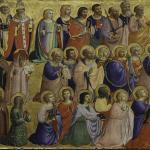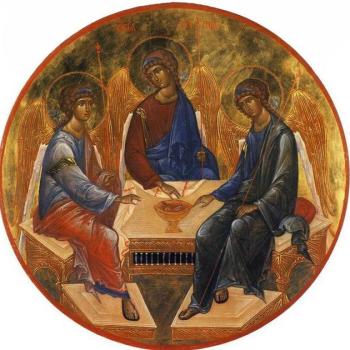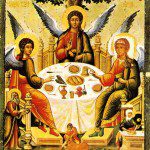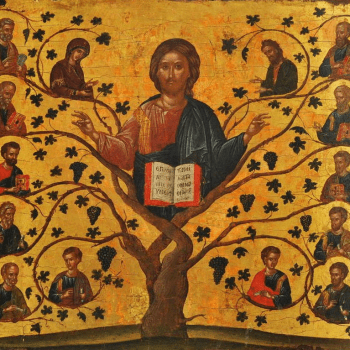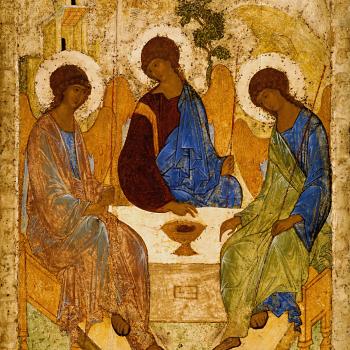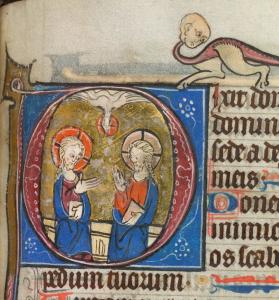
God made us not only to exist on our own, to live our lives and make something of ourselves during them, but to participate in and experience the divine life for ourselves. We will always be creatures that God created; we will never be what God is in our nature, but as we participate in the divine nature, we can be considered to be gods by grace. When we do so, we will come to know the persons of the Trinity in an intimate manner. What we know of them now is extremely limited, but in the eschaton, in eternity, we will find the limits which we have will be in constant flux, for, as we participate in the divine life, we will receive grace which deifies us, making us greater and greater, giving us a greater ability to relate to and come to know each person of the Trinity. Thus, as our knowledge will be constantly growing, in ways beyond our natural comprehension, our knowledge will be perfected in eternity, allowing St. Bernard to say: “Perfect knowledge of the Trinity is life eternal. Yet now we know only in part; the remainder, which we can but little comprehend, we take on faith.” [1]
When St. Benard says that we are currently to take the teaching of the Trinity on faith, we must not believe that means that until the eschaton we will apprehend or understand nothing about the Trinity. We can receive insight on the Trinity in a variety of ways (Scripture, spiritual experience, logical reflection, et. al.), and through that insight, we come to believe in the reality of the Trinity. What we will find is that understanding every aspect of the Trinity, comprehending the Trinity, will be beyond us. We will discern various paradoxes which are difficult, if not impossible, for us to resolve; faith comes in by allowing us to accept such paradoxes without having them lead us to disbelieve in the truths which we have already apprehended.
We can know the identity of the three persons of the Trinity, that is, know something about them through the names or conventions used to designate them (Father, Son and Holy Spirit). Nonetheless, in using those conventions, we must be cautious and not bind the persons to them, that is, not force them to fit what those conventions normally mean in relation to human society. The Father is not to be understood as a human father, indeed, the name should not be seen as giving the divine person a gender, making us think the divine person is “male.” What is revealed to us through the name is that there is a relationship between the Father and the Son as that of a parent and a child; when we explore the relationship further, we will find that the Father is said to give birth to the Son, which shows the generation of the Son from the Father differs from the generation of human children. Similarly, the name given to the second person of the Trinity, that of Son, must not be understood as giving the second person a gender, but rather, as a convention which helps point out the kind of relationship the Son has with the Father, that of a child with a parent. We are called to share in with that relationship, thanks to the incarnation, so that everyone, no matter their gender, can find their relationship with the Father is reflected in the relationship the Father has with the Son: we become children of God, participating in the Son’s filiation (which is done by the Son’s assumption of human nature, for by it, we find ourselves joined with the Son, sharing with the Son the relationship the Son has with the Father and the Holy Spirit). The Holy Spirit, likewise, is known by us, as it comes to us, dwells with us, and makes us holy.
Even though we apprehend the Trinity in an imperfect fashion, we can and still learn much from what we do apprehend, and through it, learn something about ourselves. We are made in the image and likeness of God, in the image and likeness of the Trinity, and so to know ourselves is to know something of the Trinity, even as to know something of the Trinity is to know something about ourselves. God is love, and the teaching of the Trinity shows us how God can be love: God is not a monad, one person absorbed in self-love, but rather, God is three divine persons reaching beyond the confines of their personal hypostasis, loving each other in that self-transcendence, finding the fullness of who they are when they reach beyond themselves in and through that love. We are meant to do the same, that is, to reach beyond ourselves, beyond all egotistical individualism, by sharing ourselves and all we are to everyone, by engaging them with our love: “All the exhortations and commandments in the Gospel have as their goal love, that dynamic transcendence of ego-centric individuality whereby the image of God in Trinity is realized in the human being.” [2] So long as we are attached to ourselves, cutting ourselves off from others in and through such self-attachment, we deny the way of love, and by doing so, undermine the image of God in ourselves. On the other hand, when we follow the way of love, we will transcend ourselves; we will not be stuck on ourselves, and what we think ourselves to be, but rather, we will, as it were, die to ourselves, so that we can reach out to others and share with others all that we are. When we participate in and experience the divine life in eternity, we will find ourselves doing this perfectly, mirroring the persons of the Trinity and their self-giving love, allowing us to know and understand, not just in theory, but in experience, that the unity of the Godhead lies in the self-giving relations of love that each person of the Trinity shares with each other.
All dogmatic discussions of the Trinity serve as a way for us to try to apprehend something which we will only understand in an imperfect form so long as we do not participate in and experience the divine life for ourselves. We can use revelation, logic, philosophy, even our limited spiritual experiences, to try to help us come to terms with the truth of the Trinity, and they can do so in remarkable ways, but we must remain cautious and remember all that we offer in and through them is but a shadow of the truth itself. Faith is able to accept this, because faith accepts our limitations, while those who think they can and will not only ascertain, not only apprehend, but comprehend the truth, all by themselves, will find it difficult to live a life of faith, because they will want certainty not mystery, and the more they seek after that certainty, the more disappointed they will become.
[1] St. Bernard of Clairvaux, Sermons for the Summer Season. Trans. Beverly Mayne Kienzle and James Jarzembowski (Kalamazoo, MI.: Cistercian Publicans, 1991), 69 [Pentecost: Sermon One].
[2] Christos Yannaras, The Freedom of Morality. Trans. Elizabeth Briere (Crestwood, NY: St. Vladimir’s Seminary Press, 1984), 56.
Stay in touch! Like A Little Bit of Nothing on Facebook.
If you liked what you read, please consider sharing it with your friends and family!
N.B.: While I read comments to moderate them, I rarely respond to them. If I don’t respond to your comment directly, don’t assume I am unthankful for it. I appreciate it. But I want readers to feel free to ask questions, and hopefully, dialogue with each other. I have shared what I wanted to say, though some responses will get a brief reply by me, or, if I find it interesting and something I can engage fully, as the foundation for another post. I have had many posts inspired or improved upon thanks to my readers.



